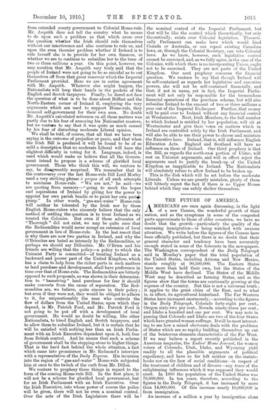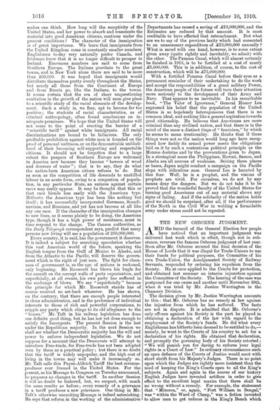THE FUTURE OF AMERICA.
AMERICANS are once again discussing, in the light of a new Census, the wonderful growth of their nation, and as the symptoms in some of the congested parts approximate to those of older countries, we have no doubt that the growth—particularly the quality of the unceasing immigration—is being watched with anxious attention. We write before the figures of the Census have been officially published, but there is no doubt that their general character and tendency have been accurately enough stated in some of the forecasts in the newspapers. The Washington correspondent of the Daily Telegraph said in Monday's paper that the total population of the United States, including Arizona and New Mexico, stands roughly at 90,500,000. The Eastern States have more than held their own, but the States of the Middle West have declined. The States of the Middle West may be described as farming States, and so the figures show that the towns are continually growing at tho expense of the country. But this is not a universal truth ; it applies to the great cities of the East, and to what is, in effect, its agricultural hinterland. The Far Western States have increased enormously,—according to the figures in the Daily Telegraph, Colorado forty-eight per cent., Oregon sixty-two per cent., Nevada ninety-three per cent., and Idaho a hundred and one per cent. We may note in passing that Colorado and Idaho are two of the four States which have granted woman suffrage. It will be most interest- ing to see how a mixed electorate deals with the problems of States which are so rapidiy building themselves up out of the boisterous elements characteristic of the Far West. If we may believe a report recently published in the American magazine, the Ladies' Home Journal, the women voters of Colorado, Utah, Idaho, and Wyoming yield readily to all the plausible arguments of political expediency, and have so far left neither on the statute- books nor on the face of social conditions—in respect of the treatment of children and of divorce—any trace of the enlightening influences which it was supposed they would eiert. In 1900 the population of the United States was 76,000,000. In ten years, therefore, according to the figures in the Daily Telegraph, it has increased by more than 14,000,000. Of this increase nearly 10,000,000 is from immigration.
An increase of a million a year by immigration alone makes one think. How long will the receptivity of the United States, and her power to absorb and transmute the material into good American citizens, continue under the present conditions ? The character of the immigration IS of great importance. We learn that immigrants from the United Kingdom come in constantly smaller numbers. Englishmen to-day very naturally prefer Canada, and Irishmen know that it is no longer difficult to prosper in Ireland. Enormous numbers are said to come from Southern Europe. The Italians gravitate to the great towns, and in New York alone there are said to be more than 200,000. It was hoped that immigrants would distribute themselves pretty evenly throughout the States, but nearly all those from the Continent of Europe and from Russia go, like the Italians, to the towns. It seems certain that the era of sheer unquestioning exultation in the growth of the nation will soon give place to a scientific study of the racial elements of the develop- ment. Such a study is, we fear, apt to become far too positive ; the students of racial characteristics, as of criminal anthropology, often found. conclusions on in- adequate premisses. We hope that the United States will not come to the point of erecting the barrier of a " scientific tariff " against white immigrants. All racial discriminations are bound to be fallacious. The only profitable prohibition against white men is founded on the proof of personal unfitness, or on the demonstrable unlikeli- hood of their becoming self-supporting and respectable citizens. It should not be forgotten that to a large extent the paupers of Southern Europe are welcomed in America now because they become " hewers of wood and drawers of water "; that is to say, they do what the native-born American citizen refuses to do. But as soon as the competition of life descends to unskilled labour in an acute form, owing to a congestion of popula- tion, in any particular State, an animus against certain races may easily appear. It may be thought that this or that race blends less easily with the American type. Hitherto the American type has been like nothing but itself; it has successfully incorporated Germans, Scandi- navians, and Russians, and yet has not become at all like any one race. If the character of the immigration changes to new lines, as it seems plainly to be doing, the American type, though it has a high power of resistance, must in time respond to the change. The Census authorities, as the Daily Telegraph correspondent says, predict that many persons now living will see a population of 250,000,000. Every country, it is said, has the government it deserves. It is indeed a subject for searching speculation whether this vast American world. of the future, speaking the English tongue from the Gulf of Mexico to Alaska, and from the Atlantic to the Pacific, will deserve the govern- ment which is the right of just men. The fight for clean- ness of government is, as the age of nations is reckoned, only beginning. Mr. Roosevelt has blown his bugle for the assault on the corrupt walls of party organisation, and superficially, at all events, his own party has suffered. in the exchange of blows. We say " superficially " because the principle for which Mr. Roosevelt stands has of course received no set-back whatever. He has shown, on the contrary, that there are enough people interested in clean administration, and in the preference of individual interests to those of rich and powerful corporations, to cripple any party which clings to its old allegiance to the " bosses." Mr. Taft in his railway legislation has done one definite good thing, but he has not yet done enough to satisfy the Insurgents. The present Session is the last under the Republican majority. In the next Session we shall see whether the Democratic majority has the will and power to enforce independent legislation. We do not suppose for a moment that the Democrats will attempt to introduce Free-trade, for Free-trade has not been adopted even by them as a practical policy ; but there is no doubt that the tariff is widely unpopular, and the high cost of living in the towns may well make it increasingly so. Mr. Taft calls this Payne-Aldrich Tariff the best revenue- producer ever framed in the United States. For the present, as his Message to Congress on Tuesday announced, he proposes no changes in the tariff. In another Session it will no doubt be tinkered, but, we suspect, with much the same results as before ; every remedy of a grievance in a tariff produces a new grievance. One thing in Mr. Taft's otherwise unexciting Message is indeed astonishing. He says that reform in the working of the administrative. Departments has caused a saving of £13,000,000, and the Estimates are reduced by that amount. It is most creditable to have effected that retrenchment. But what are we to say of the previous laxity which had consented to an unnecessary expenditure of £13,000,000 annually ? What is saved with one hand, however, is to some extent given away (quite rightly and inevitably, we admit) with the other. The Panama Canal, which will almost certainly be finished in 1915, is to be fortified at a cost of nearly £5,000,000. This is in addition, of course, to the cost of construction, which will be £75,000,000.
With a fortified Panama Canal before their eyes as a permanent reminder of their undertaking to do the work and accept the responsibilities of a great military Power, the American people of the future will turn their attention more seriously to the development of their Army and Navy. That appears to us inevitable. In his remarkable book, " The Valor of Ignorance," General Homer Lea expressed his belief that the population of the United States is so hopelessly heterogeneous that there is no common ideal, and nothing like a general aspiration towards good. citizenship. He believes that Americans are more criminal than any civilised. nation, and that there is in the mind of the mass a distinct tinge of " feminism," by which he seems to mean irrationality. He thinks that if these things were not so the nation would long ago have recog- nised how feebly its armed power meets the obligations laid on it by such a contentious political principle as the Monroe doctrine and by the provocations given to Japan. In a strategical sense the Philippines, Hawaii, Samoa, and Alaska are all sources of weakness. Seizing these places as bases, Japan might conduct a campaign on the Pacific slope with ridiculous ease. General Lea is haunted by this fear. Well, he is a prophet, and the visions of prophets are vivid. For ourselves, we do not by any means deny the dangers. But we do not take it to be proved that the wonderful faculty of the United States for turning good Americans out of any material shows any signs of failing. And if the solidarity of the nation holds good we should. be surprised, after ail, if the performance of the North in the Civil War in welding a formidable army under stress could not be repeated.



























































 Previous page
Previous page